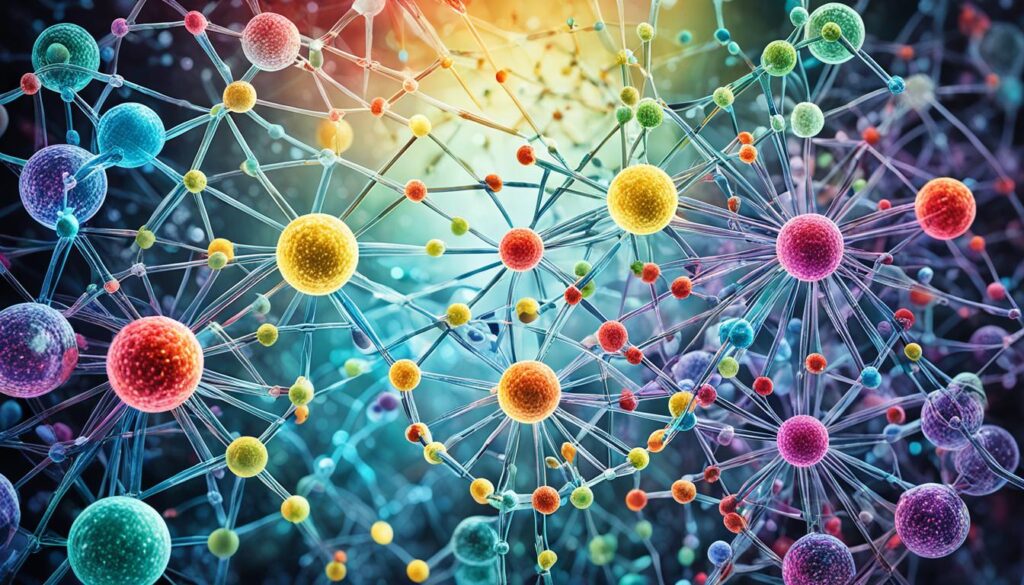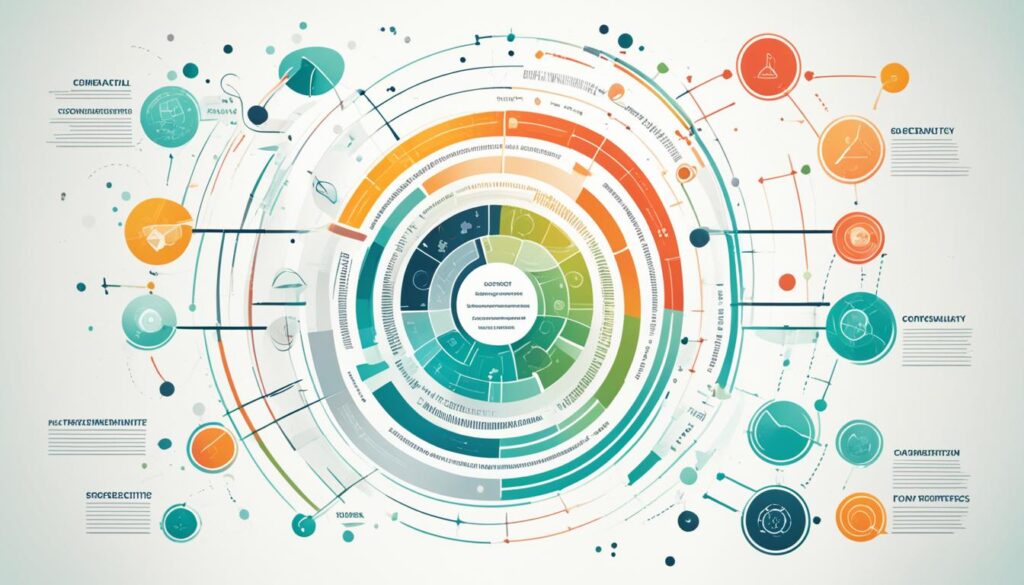Anti-aging Science: Latest Longevity Research Insights
Have you ever stopped to ponder the fleeting nature of time? The way it slips through our fingers like sand, leaving behind traces on our skin, in our thoughts, and in the depths of our emotions. As I reflect on my own journey through life, I am struck by the undeniable desire to preserve and prolong the moments that bring us joy and fulfillment.
This is precisely why the field of anti-aging science has captured my attention and ignited a passionate curiosity within me. The pursuit of understanding the secrets of longevity and unlocking the potential to live a vibrant, youthful life for as long as possible is a quest that resonates deeply with all of us.
In this captivating journey of exploration, we will delve into the latest research on longevity and uncover the groundbreaking breakthroughs, advancements, and technological innovations that are reshaping our perception of aging. From the cellular intricacies influencing the aging process to the role of genetics and lifestyle factors, we will uncover the secrets to living a longer, healthier, and more vibrant life.
Join me on this extraordinary adventure as we peer into the forefront of anti-aging science, where the boundaries of possibility are continually expanding and the promise of a more youthful future beckons. Together, let us embrace the wonders of science, discover the tools and interventions that empower us to defy aging, and unlock the potential to live our lives to the fullest.
Key Takeaways:
- Latest anti-aging studies reveal remarkable breakthroughs and innovations.
- Understanding the aging process provides insight into the factors influencing longevity.
- Longevity genes play a crucial role in the quest for a youthful future.
- Lifestyle choices and habits significantly impact healthy aging.
- Cutting-edge anti-aging interventions show promise in extending lifespan.
Understanding the Aging Process
As we journey through life, we inevitably face the aging process. This natural phenomenon affects us all, but have you ever wondered about the intricacies behind it? In this section, we will explore the aging process in greater detail, shedding light on the factors that influence how we age.
One key aspect of the aging process is cellular senescence, which refers to the state in which cells enter a permanent growth arrest. While this cellular response serves as a mechanism to prevent damaged or dysfunctional cells from proliferating, it also plays a crucial role in aging.
Cellular senescence is influenced by a variety of factors, both intrinsic and extrinsic. Intrinsic factors include genetic predispositions and the natural decline in cell repair processes that occur over time. Extrinsic factors, on the other hand, encompass external influences such as exposure to UV radiation, environmental toxins, and lifestyle choices.
By understanding the factors that contribute to the aging process, we can begin to unravel the secrets of longevity. Let’s take a closer look at the concept of cellular senescence and its impact on the longevity of an organism.
| Factors Influencing Aging | Description |
|---|---|
| Genetic Factors | Some individuals are genetically predisposed to age at a faster rate than others. Certain genes may affect processes such as DNA repair and cellular function, influencing the aging process. |
| Environmental Factors | External factors like exposure to pollution, smoking, and poor nutrition can accelerate the aging process. These factors can increase oxidative stress and inflammation within the body. |
| Lifestyle Choices | Adopting healthy lifestyle habits, including regular exercise, a balanced diet, and stress management, can positively impact the aging process. Conversely, sedentary behavior, an unhealthy diet, and chronic stress can contribute to accelerated aging. |
| Cellular Senescence | Cellular senescence, the process by which cells enter a state of permanent growth arrest, plays a significant role in aging. Senescent cells can accumulate over time, secreting harmful factors that contribute to age-related diseases and impairing tissue function. |
Understanding the aging process and the factors that influence it provides valuable insights into the quest for longevity. By addressing these factors and developing interventions to combat cellular senescence, we can potentially slow down the aging process and enhance the quality of life as we age.
Discovering Longevity Genes
In the quest for understanding the intricate process of aging, scientists have turned their attention to the fascinating world of longevity genes. These special genes play a significant role in determining an individual’s lifespan and overall health as they age. By unraveling the genetic factors that influence aging, researchers are gaining valuable insights into the mechanisms behind longevity.
Gene expression, or the activation and deactivation of genes, is a crucial aspect of the aging process. It dictates how our cells and tissues function and plays a key role in determining the rate at which we age. Genetic factors can either accelerate or slow down the aging process, impacting our susceptibility to age-related diseases and our overall longevity.
The study of longevity genes has uncovered a multitude of genetic variants that are associated with extended lifespans and enhanced healthspan—the period of life where individuals remain healthy and free from chronic diseases. These genes often affect crucial cellular processes, such as DNA repair, oxidative stress response, and inflammation modulation.
“The discovery of longevity genes has opened up exciting possibilities for interventions and therapeutics that can promote healthy aging and extend lifespan.” – Dr. Marie Thompson, Geneticist

Research in this field has identified several notable longevity genes, including:
- The FOXO family of genes: These genes regulate important cellular functions, such as DNA repair and stress resistance, and have been associated with increased lifespan in various organisms.
- SIRT1: This gene is involved in regulating cellular metabolism and stress response. Activation of SIRT1 has been linked to enhanced longevity and improved healthspan.
- MTOR pathway genes: The MTOR pathway is crucial for cellular growth and metabolism regulation. Genetic variations in this pathway have been shown to influence aging and longevity.
- Telomerase genes: Telomeres, the protective caps at the ends of chromosomes, play a vital role in cellular aging. Genes associated with telomerase, the enzyme responsible for maintaining telomeres, have been linked to increased lifespan.
The identification of longevity genes holds great promise for future anti-aging interventions and therapeutics. By targeting the genetic factors that influence aging, researchers aim to develop strategies that can slow down the aging process, delay the onset of age-related diseases, and ultimately improve overall health and lifespan.
Gene Expression and Longevity
The complex interplay between genes and aging is further illuminated by the study of gene expression. Gene expression refers to the activation or deactivation of specific genes, resulting in the production or suppression of their corresponding proteins. Gene expression patterns can change over time and can be influenced by various factors, including lifestyle choices, environmental exposures, and genetic variations.
Recent research has shown that changes in gene expression can impact the aging process. Both positive and negative changes in gene expression have been associated with age-related diseases and longevity. By identifying the specific genes and regulatory pathways involved in gene expression changes during aging, scientists are gaining valuable insights into the cellular mechanisms behind aging.
Understanding how gene expression influences aging can potentially lead to the development of targeted interventions that modulate gene expression patterns, promoting healthy aging and extending lifespan.
The Role of Lifestyle in Longevity
When it comes to healthy aging and promoting longevity, lifestyle factors play a crucial role. The habits we cultivate and the choices we make on a daily basis can have a significant impact on our overall well-being and how gracefully we age.
Exercise is one of the key lifestyle factors that contribute to healthy aging. Regular physical activity not only helps maintain strength and flexibility but also boosts cardiovascular health and enhances cognitive function. Engaging in activities such as walking, swimming, or yoga can improve longevity and promote a more active and fulfilling life.
A well-balanced and healthy diet is another important aspect of a lifestyle that fosters longevity. Consuming a variety of nutrient-rich foods, such as fruits, vegetables, whole grains, lean proteins, and healthy fats, can provide essential vitamins, minerals, and antioxidants. These elements support the body’s natural defense mechanisms, promote cellular health, and reduce the risk of chronic diseases.
“Let food be thy medicine and medicine be thy food.” – Hippocrates
Another habit that can contribute to healthy aging is stress management. Chronic stress can accelerate the aging process and impact overall health. Taking time for relaxation and engaging in activities that reduce stress, such as practicing mindfulness, meditation, or hobbies, can support longevity and improve general well-being.
Sleep hygiene also plays a vital role in promoting healthy aging. Getting enough restful sleep allows the body to repair and rejuvenate itself. A consistent sleep schedule, a comfortable sleep environment, and practices that promote relaxation before bed can all contribute to better sleep quality and ultimately, improved longevity.
By incorporating these lifestyle factors into our daily routine, we can take proactive steps towards healthy aging and promoting longevity. Embracing a lifestyle that includes regular exercise, a balanced diet, stress management, and adequate sleep sets the stage for a healthier, more vibrant future.
So, why not begin making small changes today that will have a big impact on our tomorrows?

Breakthroughs in Anti-Aging Interventions
When it comes to achieving a longer and healthier life, scientists and researchers are constantly making remarkable breakthroughs in anti-aging interventions. These cutting-edge interventions show promising results in not only extending lifespan but also rejuvenating aging cells. In this section, we will explore two key areas of focus in anti-aging research: telomeres and senolytics.
The Role of Telomeres
Telomeres are the protective caps at the ends of our chromosomes that naturally shorten as we age. They play a crucial role in cellular aging and the overall health of our bodies. Scientists have discovered that telomere length is not only an indicator of biological age but also a potential target for anti-aging interventions.
Recent studies have shown that certain lifestyle factors, including regular exercise, stress management, and a healthy diet, can help maintain telomere length and delay the cellular aging process. Additionally, telomere-targeted therapies are being developed to potentially slow down telomere shortening, allowing for healthier and more youthful cells.
The Potential of Senolytics
Another exciting area of research in anti-aging interventions is senolytics. Senescent cells, also known as aging cells, accumulate in our bodies over time and contribute to age-related diseases and the overall aging process. Senolytics are drugs or compounds designed to selectively eliminate these senescent cells, promoting rejuvenation and extending lifespan.
Preliminary studies on senolytics have shown promising results, including improved organ function, increased physical performance, and enhanced overall health span. By removing senescent cells, senolytics have the potential to delay or prevent the onset of age-related diseases and significantly improve the quality of life as we age.

In conclusion, the field of anti-aging interventions is rapidly advancing, with breakthroughs in telomere research and the potential of senolytics. These cutting-edge interventions offer new hope for extending our lifespan and rejuvenating aging cells. By targeting telomeres and developing effective senolytic therapies, scientists are paving the way for a healthier, more vibrant future.
The Future of Anti-Aging Technology
The field of anti-aging technology is undergoing a revolutionary transformation, paving the way for a future where youthfulness and vitality are no longer limited by chronological age. Futuristic innovations in epigenetics and artificial intelligence are set to redefine how we approach aging and longevity.
Epigenetics, the study of changes in gene expression, offers new insights into the mechanisms that control aging. By understanding how external factors influence gene activity, researchers are uncovering ways to potentially reverse or slow down the aging process. Epigenetic modifications can provide a blueprint for personalized anti-aging interventions, tailored to an individual’s unique genetic makeup.
Artificial intelligence (AI) is another game-changing technology that holds immense promise in the field of anti-aging. By analyzing vast amounts of data, AI algorithms can identify patterns and correlations that are beyond human capability. This enables scientists to develop targeted interventions and treatments for age-related diseases, improving both the quality and quantity of life.
“The combination of epigenetics and artificial intelligence has the potential to unlock unprecedented breakthroughs in anti-aging research, paving the way for a future where we can truly defy the limitations of aging.”
With advancements in anti-aging technology, we can envision a future where we have greater control over our own biological clock. Longevity and enhanced well-being may no longer be distant dreams but attainable realities. The possibilities offered by epigenetics and artificial intelligence are reshaping the way we perceive aging, ushering in a new era of personalized longevity interventions.

As we continue to explore the frontiers of anti-aging science, the future presents infinite possibilities for living healthier, more vibrant lives. Through the convergence of epigenetics, artificial intelligence, and other groundbreaking technologies, we are poised to unlock the secrets of longevity and rewrite the rules of aging. The journey towards a future where age becomes just a number begins here.
Longevity Trends and Research Findings
As our understanding of aging evolves, scientists are constantly uncovering new longevity trends and research findings in the field of anti-aging science. Through groundbreaking studies, we continue to gain valuable insights into the mechanisms underlying the aging process and the potential interventions that can prolong healthspan and promote healthy aging.
One of the latest findings in anti-aging research involves the role of senescence-associated secretory phenotype (SASP) in cellular senescence. Scientists have discovered that the inflammatory molecules released by senescent cells can contribute to age-related diseases, such as cancer and neurodegenerative conditions. This finding has opened up new avenues for developing therapies that target senescent cells and delay the onset of age-related diseases.
Another area of significant research involves the study of telomeres and their role in cellular aging. Telomeres are protective caps at the ends of chromosomes that shorten with each cell division. Recent studies have revealed that telomere maintenance and preservation play a crucial role in prolonging cellular lifespan. Researchers are exploring various interventions, such as telomerase activation, to prevent telomere shortening and promote healthy aging.
“The study of senescence-associated secretory phenotype (SASP) has provided new insights into the link between cellular senescence and age-related diseases.”
Advancements in anti-aging research have also led to the discovery of promising interventions, such as senolytics. Senolytics are compounds that selectively eliminate senescent cells, thereby improving overall health and lifespan in animal models. This breakthrough has sparked hope for the development of anti-aging therapies that can target and eliminate harmful senescent cells in humans.
Additionally, significant progress has been made in understanding the role of epigenetics in aging. Epigenetic modifications, such as DNA methylation and histone modifications, can influence gene expression and impact the aging process. Scientists are investigating the potential of epigenetic modifications as targets for anti-aging interventions, paving the way for personalized anti-aging treatments tailored to an individual’s epigenetic profile.

| Research Finding | Significance |
|---|---|
| SASP and inflammatory molecules | Provide insights into age-related diseases and potential therapeutic targets for intervention |
| Telomere maintenance | Reveals the importance of preserving telomeres for healthy aging |
| Senolytics | Promising intervention to remove senescent cells and extend lifespan |
| Epigenetic modifications | Highlight the role of gene expression in the aging process and potential for personalized anti-aging treatments |
These latest findings and scientific breakthroughs demonstrate the dynamic landscape of anti-aging research. By staying abreast of the evolving longevity trends and groundbreaking discoveries, we can better understand the mechanisms of aging and unlock new possibilities for extending healthspan and promoting healthy aging.
Enhancing Longevity: Lifestyle Tips
In our quest for a longer and healthier life, it is essential to adopt a lifestyle that supports longevity. By implementing simple yet effective strategies, we can enhance our well-being and promote healthy aging. Here are some practical tips to help you on your journey:
- Prioritize stress management: Chronic stress can have detrimental effects on our health and contribute to premature aging. Take time for self-care activities such as meditation, deep breathing exercises, or engaging in hobbies that bring you joy. Find what works best for you and make stress reduction a priority.
- Practice healthy sleep hygiene: Quality sleep is crucial for our overall well-being. Create a relaxing bedtime routine, ensure your sleep environment is calm and comfortable, and aim for 7-9 hours of uninterrupted sleep each night. Prioritizing sleep will help you wake up feeling refreshed and rejuvenated.
- Adopt a balanced diet: Nourishing your body with nutritious foods is key to promoting longevity. Emphasize whole foods such as fruits, vegetables, lean proteins, whole grains, and healthy fats. Limit processed foods, sugary beverages, and excessive salt intake. Remember, a well-balanced diet is the foundation for a healthy life.
- Engage in regular physical activity: Exercise is essential for maintaining a healthy body and mind. Find activities that you enjoy, whether it’s brisk walking, jogging, cycling, swimming, or dancing. Aim for at least 150 minutes of moderate-intensity exercise per week.
- Cultivate social connections: Building and nurturing relationships with family, friends, and community members is essential for our well-being. Surround yourself with positive and supportive individuals who uplift and inspire you. Engage in meaningful social interactions and contribute to your community in any way you can.
- Protect your skin from sun damage: Excessive sun exposure can accelerate the aging process and increase the risk of skin cancer. Wear sunscreen with at least SPF 30, seek shade when the sun is strongest, and wear protective clothing and accessories.
Remember, adopting a healthy lifestyle is a lifelong journey. By implementing these tips into your daily routine, you’ll be taking important steps towards enhancing your longevity and enjoying a vibrant and fulfilling life.

Integrating Anti-Aging Science into Daily Life
When it comes to maintaining a youthful and vibrant appearance, incorporating anti-aging strategies and longevity practices into your daily life is key. By adopting age-defying habits and cultivating a mindset shift, you can embrace healthy aging and enhance your overall well-being.
Discovering the Power of Anti-Aging Strategies
Anti-aging strategies encompass a wide range of practices aimed at slowing down the aging process and promoting longevity. These strategies can include:
- Maintaining a nutritious and balanced diet rich in antioxidants and essential nutrients.
- Engaging in regular exercise to keep your body strong and flexible.
- Practicing stress management techniques to reduce the negative impact of chronic stress on your health.
- Getting quality sleep to support your body’s natural rejuvenation and repair processes.
- Protecting your skin from harmful UV radiation by wearing sunscreen and adopting a skincare routine that nourishes and hydrates your skin.
By incorporating these anti-aging strategies into your daily life, you can optimize your health and well-being, improve your physical appearance, and increase your chances of living a long and fulfilling life.
The Mindset Shift: Embracing Healthy Aging
“Aging is not lost youth but a new stage of opportunity and strength.” – Betty Friedan
Embracing healthy aging involves shifting your mindset from viewing aging as a negative process to recognizing it as an opportunity for personal growth and continued vitality. It’s important to embrace the following mindset shifts:
- Embrace lifelong learning: Cultivate a thirst for knowledge and seek opportunities to learn and grow intellectually.
- Adopt a positive mindset: Focus on the positives in life, practice gratitude, and surround yourself with positive influences.
- Stay socially active: Maintain strong connections with family and friends, and engage in activities that foster community and social interaction.
- Pursue new passions: Explore new hobbies and interests that bring joy and fulfillment to your life.
- Practice self-care: Prioritize self-care activities that nourish your mind, body, and soul.
By making these mindset shifts and embracing healthy aging, you can create a fulfilling and vibrant life as you age gracefully.

Conclusion
After exploring the latest research on anti-aging and longevity, it’s clear that the field of anti-aging science is rapidly evolving, offering promising insights and breakthroughs. Key takeaways from this article include the understanding that the aging process is influenced by various factors, including cellular senescence and genetics. Lifestyle choices, such as maintaining a healthy diet and engaging in regular exercise, have a significant impact on promoting healthy aging and longevity.
The advancements in anti-aging interventions, such as rejuvenation therapies and the potential of telomeres and senolytics, show remarkable promise in slowing down the aging process and prolonging lifespan. Additionally, the future of anti-aging technology looks bright, with the potential of epigenetics and artificial intelligence to revolutionize the way we approach aging.
In conclusion, it is crucial to stay informed about the latest anti-aging research and trends to make informed decisions about our health and well-being. By embracing the principles of anti-aging science and integrating them into our daily lives, we can take active steps towards living a healthier and more youthful future. Let’s strive to embrace healthy aging and longevity and unlock the secrets to a longer, happier life.
FAQ
What is anti-aging science?
Anti-aging science is a field of study that focuses on understanding the process of aging and finding ways to slow down or reverse its effects. Researchers in this field explore various biological, genetic, and lifestyle factors that influence aging and strive to develop interventions and technologies to promote healthy aging and longevity.
What is the latest research on longevity?
Scientists are constantly conducting studies to unravel the mysteries of longevity. The latest research on longevity encompasses topics such as the role of genetics, cellular senescence, lifestyle factors, and cutting-edge anti-aging interventions. These studies aim to uncover the mechanisms that influence lifespan and discover strategies to enable individuals to live longer, healthier lives.
What are some recent breakthroughs in anti-aging science?
Recent breakthroughs in anti-aging science include advancements in rejuvenation therapies, such as telomere manipulation and the use of senolytics to remove senescent cells. Researchers are also exploring the role of epigenetics and artificial intelligence in developing innovative anti-aging technologies. These breakthroughs offer exciting possibilities for extending lifespan and improving overall well-being.
How does lifestyle affect longevity?
Lifestyle choices have a significant impact on longevity. Engaging in regular physical exercise, maintaining a balanced diet, managing stress, and practicing good sleep hygiene are some of the key factors that promote healthy aging. Adopting a healthy lifestyle can reduce the risk of chronic diseases and increase lifespan.
What are anti-aging interventions?
Anti-aging interventions refer to strategies, therapies, or technologies aimed at slowing down or reversing the aging process. These interventions may involve the use of rejuvenation therapies, such as stem cell treatments or hormonal therapies, as well as lifestyle modifications and the use of supplements. They are designed to promote healthy aging, improve overall well-being, and extend lifespan.
What does the future hold for anti-aging technology?
The future of anti-aging technology is filled with exciting possibilities. Researchers are exploring innovative approaches, such as epigenetic modifications and the integration of artificial intelligence, to develop advanced anti-aging interventions. These technologies have the potential to revolutionize the field and enhance our understanding of aging and longevity.
What are some current longevity trends?
Current longevity trends include the exploration of the benefits of intermittent fasting, the study of the microbiome’s impact on aging, and the investigation of longevity-enhancing chemicals. Scientists are also focusing on understanding the effects of social connections and psychological well-being on lifespan. These trends contribute to our evolving knowledge of how to improve and extend human life.
How can I enhance my longevity?
To enhance longevity, it is important to adopt a healthy lifestyle. This includes engaging in regular exercise, eating a well-balanced diet, managing stress effectively, prioritizing good sleep habits, and avoiding harmful habits such as smoking and excessive alcohol consumption. Additionally, staying mentally and socially engaged can also contribute to a longer, healthier life.
How can I integrate anti-aging science into my daily life?
Integrating anti-aging science into your daily life involves adopting age-defying habits and practices. This may include incorporating nutritious foods, practicing stress management techniques, engaging in regular physical activity, prioritizing sleep, and staying mentally sharp through activities such as reading and learning. Embracing a positive mindset and making informed choices based on the latest anti-aging research can also contribute to a healthier and more youthful life.
What are the key takeaways from this article?
The key takeaways from this article include the significant influence of genetics, lifestyle choices, and technological advancements on the aging process. By understanding the latest research on anti-aging and longevity, individuals can make informed decisions to enhance their well-being and promote healthy aging. Staying up-to-date with scientific breakthroughs and adopting age-defying habits can contribute to a longer and more fulfilling life.







